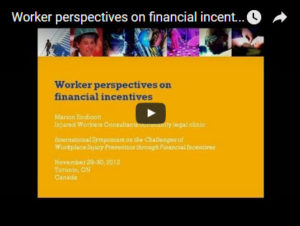Experience rating (ER) is supposed to encourage employers to make their workplaces healthier and safer and encourage return to work (by basing employer premiums on claims and costs). In reality, there is little to no evidence that experience rating accomplishes these goals. On the contrary, experience rating is detrimental to workers and employers because it provides employers with strong financial incentives to minimize costs by suppressing claims. A new (2025- ) research project will study how jurisdictions across Canada, address claims suppression, with a focus on Ontario. It will investigate not only the impact of employer misconduct on under-reporting but also how WSIB policies and practices can pose unintended barriers to filing a claim.
Workers in precarious employment have been particularly vulnerable, with experience rating encouraging the growth of Ontario’s temporary employment agency industry through which employers could outsource the more dangerous jobs and worker’s injury and illness risks.
New framework ignores “moral crisis” of claim suppression
Professor Arthurs’ 2012 report on WSIB funding identified the experience rating system in its present practice as creating a “moral crisis” that must not be ignored and called for radical change to address claim suppression – and failing that, termination of the programmes. While a 2013 Prism report for the Board found claims suppression to be a real if unquantifiable problem, the 2014 commissioned Douglas Stanley report recommended embedding experience rating even more deeply into the system to achieve “insurance equity.”
Same game under any other name….
In 2015 and 2017 the WSIB held rate framework reform consultations, with the new Rate Framework (in effect Jan 1, 2020) expanding experience rating and making it the key factor in rate setting. Submissions from injured worker advocates on the 2017 draft policies highlighted that the Rate Framework promotes premium rate equity (not a permitted purpose under the Act), that and that the policies continue to ignore :
- the incentive under experience rating to avoid premium increases by using temporary workers for more dangerous work
- the incentive for claims suppression (and the many forms it can take) by basing premium rates solely on claims costs rather than classification and actual health and safety practices
- integrating measures to promote health and safety into the rate framework

- Endicott, Marion. 2025 Jan. “Perverse outcomes: notes from the field on how financial incentives in Ontario’s workers’ compensation cause harm to a public institution and create a new occupational hazard.” New Solutions 35(1): 73-80
- Ontario Network of Injured Workers Groups. Research Action Committee. 2022 Jun. 2. Letter to WSIB: Claim Suppression, Non-reporting and Abandoned Claims.
- Experience Rating Working Group. 2018 Jan. 18. Submission re Rate Framework Policy Consultation | 2015 Oct. Submissions to the WSIB Rate Framework Reform Consultation‘
- IWO Backgrounder. 2015 Mar. Experience Rating [pdf] – [Word version]
- Schwartz, Joel. 2014. Rewarding Offenders: Report on How Ontario’s Workplace Safety System Rewards Employers Despite Workplace Deaths and Injuries. Toronto: Ontario Federation of Labour.

